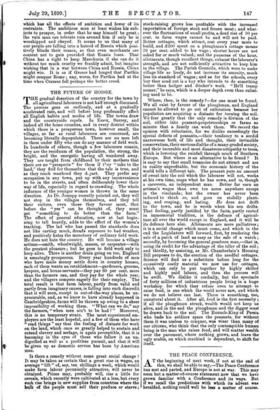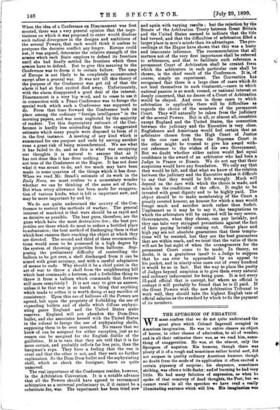THE PEACE CONFERENCE.
AT the beginning of next week, if not at the end of this, we shall be able to say,—The Peace Conference has met and parted, and Europe is not at war. This may seem but a matter-of-course statement now that we have grown familiar with a Conference and its ways. But if we recall the predictions with which its advent was heralded, nothing could well be lees a matter of course.
When the idea of a Conference on Disarmament was first mooted, there was a very general opinion that the nego- tiations on which it was proposed to enter would disclose such radical divergence in the designs and ambitions of the several Powers, that each would think it useless to
postpone the decisive conflict any longer. Europe could not, it was argued, determine the relative strength of the armies which each State employs to defend its frontiers until she had finally settled the frontiers which these armies have to defend. But to give this meaning to the Conference was to doom it to certain failure. The map of Europe is not likely to be completely reconstructed except after a general war. It was not till this theory of the purpose of the Conference was got rid of that the alarm it had at first excited died away. Unfortunately, with the alarm disappeared a good deal of the interest. Disarmament is a very big .word, and to cease to use it in connection with a Peace Conference was to forego the special work which such a Conference was supposed to do. From that time forward the Conference took its place among the ordinary " foreign intelligence" in the morning papers, and was soon neglected by the majority of readers. Yet this depreciatory estimate of the Con- ference is hardly less misleading than the exaggerated estimate which many people were disposed to form of it in the first instance. A meeting of any kind which is summoned for one purpose and ends by serving another runs a great risk of being misunderstood. We see what it has failed to do, and as this is what was occupying our thoughts it is natural to assume that as it has not done this it has done nothing. This is certainly not true of the Conference at the Hague. It has not done what it was meant to do, and too much may have been made in some quarters of the things which it has done. When we read Mr. Stead's estimate of its work in the Daily News, we must confess to a momentary wonder whether we can be thinking of the same set of facts. But when every allowance has been made for exaggera- tion of various kinds, what is left is important now, and may be more important by and by.
We do not quite understand the anxiety of the Con- ference to restrict the methods of warfare. The general interest of mankind is that wars should be as rapid and as decisive as possible. The best guns, therefore, are the guns which have the most destructive fire ; the best pro- jectiles are those which do most to reduce a fortified place to submission; the best method of discharging them is that which best ensures their reaching the object at which they are directed. The second and third of these recommenda- tions would seem to be possessed in a high degree by the system of throwing projectiles from balloons. Sup- posing the preliminary difficulty of controlling the balloon to be got over, a shell discharged from it can be aimed with great accuracy, and with a careful adaptation of means to ends. Why should it be a chief point in the art of war to throw a shell from the neighbouring bill which best commands a fortress, and a forbidden thing to throw it from a balloon which commands that fortress still more completely ? It is not easy to give an answer, unless it be that war is so harsh a thing that anything which tends to soften it is worth doing at any sacrifice of consistency. Upon this use of balloons all the Powers are agreed, but upon the propriety of forbidding the use of expanding bullets and of shells which diffuse asphyxi- ating gases England and the United States make reserves. England will not abandon the Dum-Durn bullet, and she associates herself with the United States in the refusal to forego the use of asphyxiating shells, supposing them to be ever invented. No reason that we know of can be assigned for either exception, just as no reason can be assigned for the English dislike of the guillotine. It is in vain that they are told that it is far more certain, and probably inflicts far less pain, than the hangman's rope. They have a feeling that the one is cruel and that the other is not, and they seek no further explanation. So the Dum-Dum bullet and the asphyxiating shell, which so shock the foreigner, leave us quite unmoved.
The real importance of the Conference resides, however, in the Arbitration Convention. It is a notable advance that all the Powers should have agreed to recommend arbitration as a universal preliminary to, if it cannot be a substitute for, war. The experiment has been tried now and again with varying results ; but the rejection by the Senate of the Arbitration Treaty between Great Britain
and the United States seemed to indicate that the tide had turned, and that the difficulties of arbitration filled a larger place in men's minds than its advantages. The pro- ceedings at the Hague have shown that this was a haste and inaccurate inference. The recommendation that all matters not of the very first importance shall be referred to arbitrators, and that to facilitate such reference_ a permanent Court of Arbitration shall be created from which the arbitrators in each particular case shall be chosen, is the chief result of the Conference. It is,.of course, simply an experiment. The Convention bail recognised that there is a large class of cases which de not lend themselves to such treatment,—cases in which national passion is so much roused, or national interest so deeply concerned, that no decree of a Court of Arbitration would be obeyed. And even in those cases to which arbitration is applicable there will be difficulties as regards the choice of the members of the permanent Court. They will naturally be taken from the Judiciary of the several Powers. But in all, or almost all, countries except England and the United States, the connection between the judiciary and the Executive is very close. Englishmen and Americans would feel certain that an arbitrator chosen from the High Court of. Justice in the one case and from the Supreme Court. in the other might be trusted to give his award with- out reference to the wishes of his own Government. But we doubt whether either nation would feel equal confidence in the award of an arbitrator who had been a Judge in France or Russia. We do not say that their suspicions would have any foundation. We only say that they would be felt, and that what we know of the relatien between the judiciary and the Executive makes it difficult to say that they would be felt wrongly. Much will depend on the care with which the choice is made, and much on the conditions of the office. It ought to be invested with great dignity and to be highly paid. The object should be to make membership of the Court a greatly coveted honour, an honour for which a man would forego much and sacrifice much rather than forfeit. Unpleasant as it may be to say it, the temptations to which the arbitrators will be exposed will be very severe. Governments, when they choose, can pay lavishly, and they can take very stringent precautions against the fact of their paying lavishly coming out. Great place and high pay are not absolute guarantees that these tempta- tions will be resisted, but they are the best guarantees that are within reach, and we trust. that the value of them will not be lost sight of when the arrangements for the permanent Court come to be made. In theory, no doubt, it is a gratuitous insult to a Judge to suppose that he can ever be approached by an appeal to his pocket, and in ninety-nine cases out of every hundred it would be so in fact. But the way to place the purity of Judges beyond suspicion is to give them every natural and ordinary inducement for being pure. It is not every ill-paid official that is corrupt, but where an official is corrupt it will probably be found that he is ill paid. If the Great Powers wish the new Arbitration Tribunal to work well, they should take the highest English rate of official salaries as the standard by which to fix the payment of its members.



































 Previous page
Previous page